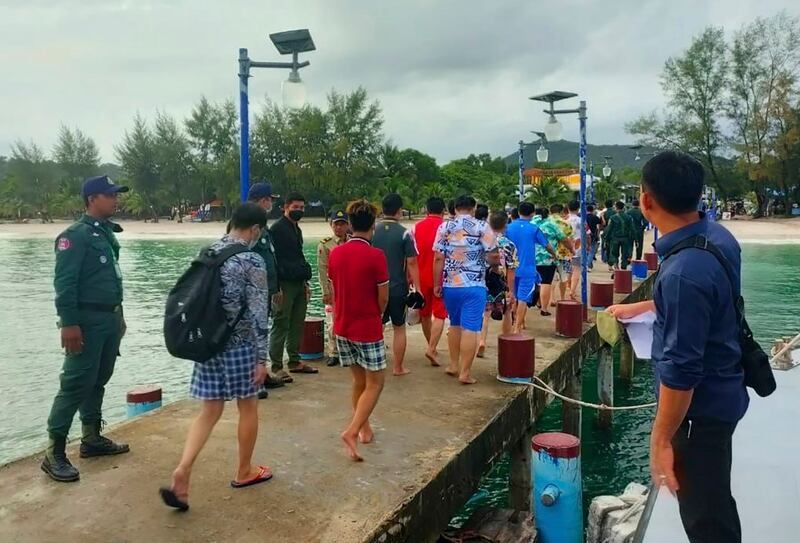At least one person is dead and 19 more are missing after a boat carrying 41 Chinese passengers sank in the Gulf of Thailand, authorities said Friday.
The small wooden fishing boat went down Thursday near Cambodia’s Koh Tang Island en route to Sihanoukville in the country’s southwest, a city that has seen an influx of Chinese expats and a spate of work scam human trafficking cases.
Authorities have not yet said why the 38 men and three women were trying to get to Cambodia by boat.
Rescue workers were able to retrieve 18 people as the boat began to slip below the water but 23 more were initially reported missing.
On Friday, three men who had been on board were found alive, while another woman was found dead, according to an Associated Press report that quoted a Sihanoukville province official.
The passengers began their trip in the Chinese port city of Guangzhou on Sept. 11 aboard a speedboat, before transferring to the Cambodian fishing boat on Sept. 17 in international waters, Sihanoukville’s provincial police chief, Gen. Chuon Narin, told local media, according to the AP report.
After the boat began to sink, another Cambodian boat came to rescue the two Cambodian crewmembers, leaving the Chinese passengers behind, he said. The two have since been arrested for questioning.
Cambodian authorities are still searching for the remaining 19 Chinese nationals, offering a 2 million riel (U.S. $484) reward to anyone who rescues any of them.
Though the purpose of their trip has not been confirmed, they might have been tricked into illegally working in Sihanoukville, Cheap Sotheary, provincial project coordinator for the Cambodian Human Rights and Development Association, told RFA’s Khmer Service.
“Ring leaders have distributed [human trafficking victims] to other provinces [across Cambodia],” she said. “The victims don’t fly in, they use cars or boats.”
RFA recently reported several other cases of migrants trafficked to Cambodia through Sihanoukville.

Diaspora reacts
Economic conditions in China may be why the 41 Chinese may have attempted to sneak into Cambodia, a Chinese businessman identified by his surname Fan told RFA’s Mandarin Service.
China has been devastated economically by its zero-COVID policy, which has included shutdowns of commerce in many of its cities. People who depend on their jobs for survival have had to get by with little to no income.
"This tragedy happened because there was no job opportunity in China, and they tried their best to escape,” Fan said.
The news was shocking to a man from Guangzhou who requested anonymity to speak freely.
“Who wants to leave their hometown and go abroad with great language barriers?” he said, noting that although Guangzhou is one of the most prosperous regions in China, its economy is very poor and it is not easy to find a job there.
He said the incident was reminiscent of the 1970s when people were smuggled to Hong Kong from Guangzhou.
"It's really miserable right now. People used to be smuggled into the United States, but now they are being smuggled into Cambodia,” he said.
China’s most impoverished citizens are willing to take desperate risks for a better life elsewhere, a tourism expert surnamed Luo, who specializes in Chinese tourism in Vietnam, told RFA.
For Canadian human rights activist and journalist Sheng Xue, the incident brought back memories of the 2000 human smuggling tragedy, where 58 Chinese were found suffocated to death in the back of a freight truck in the U.K.
“Why is it that the Americans and the Japanese do not smuggle themselves [to other countries]? Why do the Chinese?” she told RFA. “China’s political system limits everyone’s right to freedom, so that is to blame.”
Chinese stowaways are trying to get to any place that will give them freedom, democracy, human rights, dignity, security and a little bit of money, she said.
Additional reporting by Qi Desai for RFA Mandarin. Translated by Samean Yun and Zirong Ye. Written in English by Eugene Whong.
